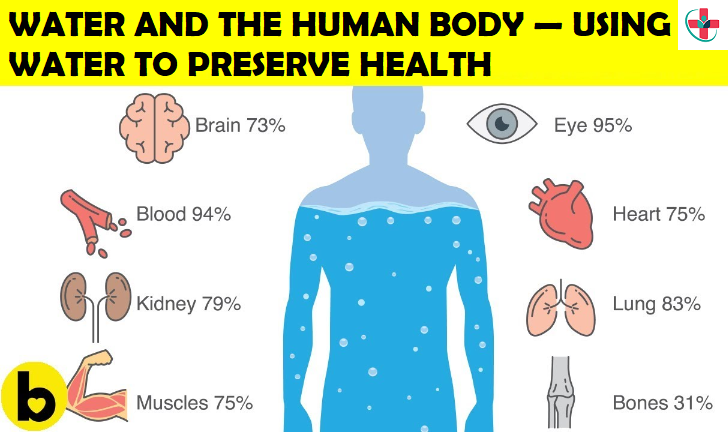Getting enough water every day is important for your health. Healthy people meet their fluid needs by drinking when thirsty and drinking with meals. Most of your fluid needs are met through the water and beverages you drink. However, you can get some fluids from the foods that you eat. For example, broth soups and foods with high water content such as celery, tomatoes, or melons can contribute to fluid intake.
WATER AND THE HUMAN BODY
With the exception of pure air, there is no other element in nature that is so important for sustaining life or that has such an important relation to the human system as pure water. A person can live a week or sometimes even much longer on water alone but dies quickly if he is deprived of it. A large proportion of our food is composed of from 15 to 90 percent water.
Water undergoes no change in the body, but its presence is absolutely essential for the performance of the vital functions, as it enables various organs to perform their work so that life is sustained. The circulatory system is especially dependent upon water. Water composes a large percentage of the fluid portion of the blood that suspends the blood corpuscles as well as the nutritive and waste elements. With the aid of water, nutrients enter the blood and are conveyed to critical areas of the intricate human mechanism where repair and growth are needed.
There is no other substance that is so well adapted for this exact purpose as water. It circulates through the most delicate capillaries without friction and even passes through membranes into parts of the body that are not accessible by natural openings. Water is continually passing out of the body through one or more of the organs of elimination - skin, kidneys, lungs, or intestines. If the kidney becomes obstructed, we all know there will be serious trouble. The dry air constantly entering the lungs during normal breathing absorbs moisture from the pulmonary membranes. Therefore, it is necessary to supply the body with an abundance of pure water at all times. The average person eliminates about five pints of water in twenty-four hours, and an equal new supply must be provided in order to preserve the fluidity of the blood. People who work hard physically and perspire profusely naturally require more water than others.
It should also be noticed that the diet has a great deal to do with the amount of water demanded by nature. People who eat largely of animal products and use salt, pepper, spices, and condiments freely, require considerably more water to dissolve and cleanse the system of these unhealthful things. On the other hand, people who eat mostly fruits, vegetables, and grains, and avoid the use of stimulating foods and drinks, require less water as a great many vegetables and fruits are composed of more than half water.
Water is the only substance that really quenches the thirst. Other beverages will relieve thirst only in proportion to the amount of water they contain. Most of these drinks are unwholesome because of the injurious substances that are added.
AMOUNT OF WATER NEEDED DAILY
The average person does not drink enough pure water. At least six to eight glasses must be taken daily. More is better depending on the kind of food eaten. Cool water is good, but ice water should not be taken. Babies and delicate patients should be given water as carefully as food.
SEE Why you should monitor your Total Body Water
SEE Why you should monitor your Total Body Water
When one drinks an abundance of pure, fresh water the blood and tissues are bathed and purified, thereby being cleansed of all poisons and waste matter. Water is also an essential constituent of the tissue cells and all body fluids, such as the digestive juices, etc.
Water dissolves the nutritive material in the course of digestion so that it can be absorbed into the blood and carried to various parts of the body to repair and build tissues and remove waste.
Water keeps all mucous membranes of the body soft and prevents friction of their surfaces.
Water aids in regulating body temperature and body processes.
Make a special effort to obtain the purest water available. Recent scientific evidence suggests that elderly people may not feel thirsty even when their bodies are actually in need of water. It was also found that, despite the body’s need for more fluid as would be expected under these circumstances. These factors may lead to the formation of kidney stones and contribute to constipation, an all-too-common problem in the elderly. Therefore, as you grow older, it is even more important that an adequate supply of fluid be obtained every day.
ALSO, READ - 9 BENEFITS OF DRINKING WARM WATER EVERY MORNINGIf you think you are not getting enough water, these tips may help:
- Carry a water bottle for easy access when you are at work or running errands.
- Freeze some freezer-safe water bottles. Take one with you for ice-cold water all day long.
- Choose water instead of sugar-sweetened beverages. This can also help with weight management. Substituting water for one 20-ounce sugar-sweetened soda will save you about 240 calories. For example, during the school day, students should have access to drinking water, giving them a healthy alternative to sugar-sweetened beverages.
- Choose water when eating out. Generally, you will save money and reduce calories.
- Add a wedge of lime or lemon to your water. This can help improve the taste and help you drink more water than you usually do.
$ads={1}

